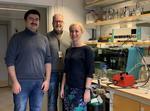Other

“The rare metal terbium has been found in an exoplanet’s atmosphere for the first time. The researchers at Lund University in Sweden have also developed a new method for analyzing exoplanets, making it possible to study them in more …

“Research at Lund University in Sweden has found a new way to create nano-sized magnetic particles using ultrafast laser light pulses. The discovery could pave the way for new and more energy-efficient technical components and become useful in the quantum …

“Researchers at Lund University in Sweden have succeeded in developing a simple hydrocarbon molecule with a logic gate function, similar to that in transistors, in a single molecule. The discovery could make electric components on a molecular scale possible in …

“For many years, a bottleneck in technological development has been how to get processors and memories to work faster together. Now, researchers at Lund University in Sweden have presented a new solution integrating a memory cell with a processor, which …

“An international study led from Lund University in Sweden shows that 30 per cent of the energy in a certain type of light-absorbing iron molecule disappears in a previously unknown manner. By closing this loophole, the researchers hope to contribute …

“In recent years, researchers have tried to capture the electrical current that bacteria generate through their own metabolism. So far, however, the transfer of the current from the bacteria to a receiving electrode has not been efficient at all. Now …

“Solar storms can be far more powerful than previously thought. A new study has found evidence for the third known case of a massive solar storm in historical times. The researchers believe that society might not be sufficiently prepared if …

“Astronomers from Lund University in Sweden have now found the explanation to a recent mystery at the centre of the Milky Way galaxy: the high levels of scandium discovered last spring near the galaxy’s giant black hole were in …

“Forget high-speed cameras capturing 100 000 images per second. A research group at Lund University in Sweden has developed a camera that can film at a rate equivalent to five trillion images per second, or events as short as 0 …

